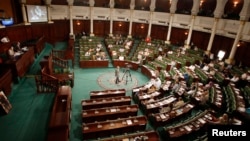Tunisian electoral authorities on Tuesday approved 27 candidates for November's presidential election, including the current president and at least five former ministers from the government of ousted autocrat Zine El Abidine Ben Ali.
Since its 2011 uprising, Tunisia has advanced toward a democracy seen as a model for the region. The North African state will hold a parliamentary vote on Oct. 26 and presidential ballot in Nov. 23 after adopting a new constitution this year.
"We accepted officially 27 candidates in presidential elections from a total of 70 candidates who filled their papers," Chafik Sarsar, head of the country's election commission said.
Under the country's new constitution, the president makes senior military and foreign policy appointments as well as nominating the prime minister, but the prime minister retains more powers than the president.
Tunisia's main Islamist party, Ennahda, which governed in a coalition after the 2011 revolution, said this month it would not contest the presidential election in November, in the interest of allowing Tunisians more choice.
Ennahda won the first free election after the overthrow of Ben Ali in 2011, but was accused by the opposition of seeking to entrench itself in power, disregarding a large secular urban population and being lenient toward radical Islamists.
Among the candidates for the November presidential poll are Abd Errahim Zouari, a former transport minister, Mondher Zenaidi, a former health minister and Kamel Morjan, a former foreign minister. All were part of Ben Ali's government.
Beji Caid Essebsi, the leader of Tunisia's main secular party Nida Tounes, is among the more prominent candidates. Essebsi also served as house speaker under Ben Ali's rule.
Another leading candidate is Kamel Nabli, the former central bank governor who served under Ben Ali as a minister.
Ennahda is one of the two front-running parties to win next month's parliamentary election and may secure the next prime minister post. But opposition groups say its dominance of the last government almost derailed Tunisia's transition to democracy.





